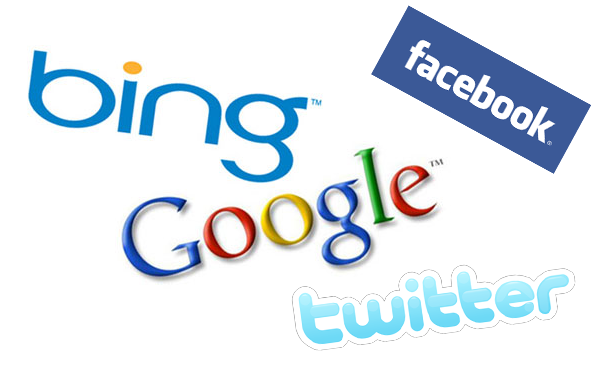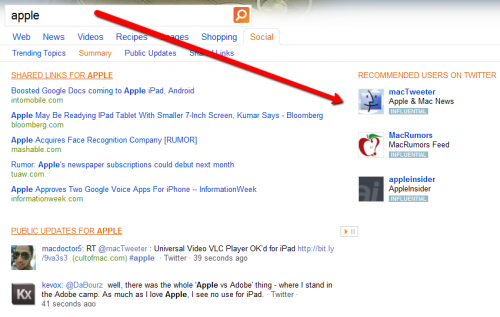Twitter & Facebook links affect SEO on Google and Bing
 Few days ago Danny Sullivan, editor-in-chief of Search Engine Land, published a very interesting article which confirms the suspicions of many SEOs: Social Media buzz does affect the organic rankings of Google and Bing.
Few days ago Danny Sullivan, editor-in-chief of Search Engine Land, published a very interesting article which confirms the suspicions of many SEOs: Social Media buzz does affect the organic rankings of Google and Bing.
As we recommended in a previous article “How to Speed up Search Engine Indexing”, social media links can help you speed up your website’s indexing and they are taken into account by Search Engines even if they are nofollowed. Certainly social media buzz could serve as a great signal for search engines but the main question is does it actually affect directly the rankings?
In the short interview, Danny Sullivan asks whether the data that come from Twitter and Facebook are used as a signal and whether they affect the regular search results. Both Google and Bing answered that not only they do take them into account but also, as expected, they try to evaluate the authority of the author and the quality of the post.
Below you will find the hottest questions that have been answered form this interview along with the replies of each Search Engine:
| Bing | ||
| Are Regular Search Results affected by social media buzz? | Yes. It is used as a signal especially for news. | Yes it is a signal. Some weight is passed and regular results are affected. |
| Are Social/Realtime Search Results affected by buzz? | Heavily affected | Heavily affected, Authority metrics are used to determine the hot posts. |
| Are Twitter links taken into account (aka do they pass link juice)? | In some limited situations the data are used. | The data are used. The weight depends on how often a link is posted, the number of tweets & retweets and the authority of the people that post it. |
| Are Facebook links taken into account? | The shared links from Fan pages are treated similarly to Twitter links. No links from personal walls are used. | Only the publicly shared links from Fan pages and Profiles are taken into account. |
| Is there an Authority Rank for Twitter Profiles? | Yes, the author quality is measured. Google calls this Author Authority. | Yes. Several metrics are taken into account. Bing calls this Social Authority. |
| Is there an Authority Rank for Facebook Profiles? | They are treated similarly to Twitter Profiles.
Note: Normally if this is true, they measure only public profiles like Fan pages. |
No. They take into account only the Facebook data that are publicly available. |
| Does the Twitter Authority have an impact on the weight of the links that are shared? | Yes. The weight depends on the authority of the person. The Author Authority is used in limited situations and it is independent of PageRank. | The Author Authority affects the link weight. |
| Does the Facebook Authority have an impact on the weight of the links that are shared? | Similarly to Twitter. The weight of each link depends on the authority of the profile. | They don’t use Facebook authority. Instead in order to find if something is really popular they compare Twitter & Facebook shares. |
So how do Google and Bing evaluate the Social Media Buzz?
First of all let’s stress that you should not focus only on Social Media. The fact that the buzz does affect the rankings does not mean that it became the most important ranking factor. In fact both search engines made it clear that the effects from buzz are still limited and that they do lots of calculations to filter out spam.
Nevertheless, since our suspicions are confirmed, we can easily speculate what are the key factors that are used by Search Engines when they evaluate Social Media Buzz. Their main target is to filter out the spam, to evaluate the trust and the weight of the links, to ensure that a page is indeed popular, to find the authority of each author and to get a clue about the topic or theme of the post.

Below you can find a list of factors that are most likely to affect the authority and the trust of the social media links. Please note that the below factors are not officially confirmed by Search Engines, but most of them are already used by several web services & tools that evaluate Social Media popularity:
- The number of Followers on Twitter
- The number of Fans on Facebook Fan Pages
- The number of tweets & RTs on Twitter
- The number of Shares & Likes on Facebook
- The ratio between Followers-Friends
- The authority of the people that follow you
- The authority of the people that share your content
- The average quality of your previously shared messages
- The number of unique mentions/shares (similar to Link Diversity)
- The rate and the source of links that you share
Moreover search engines are expected to use Social Media buzz to determine:
- How fresh a particular post is
- If an page is still useful/valid/up-to-date
- What are the current trends
- Which terms are related to the particular post. They are likely to use the keywords and the hash tags that can be found in the content of the shared messages.
- The theme or the topic of expertise of each Author. Users that tend to post high quality messages about a particular topic are likely to be considered as experts. Bing already uses this feature by recommending users on Twitter.

Wrapping things up
Social Media become more and more important and Search Engines have already made in the past several deals with Twitter and Facebook in order to incorporate social media results in their SERPs. The fact that the buzz is a signal is no news for the industry, since we all suspected that it had to be used in order to determine trends, popularity, authority etc. Finally it is certain that in the following weeks we’ll have more info available and it is very likely to get additional indications on which factors are more important.
Stay tuned and don’t forget to share this article if you like it. It is very likely to help our SEO campaign! 😉

 59 Comments
59 Comments


